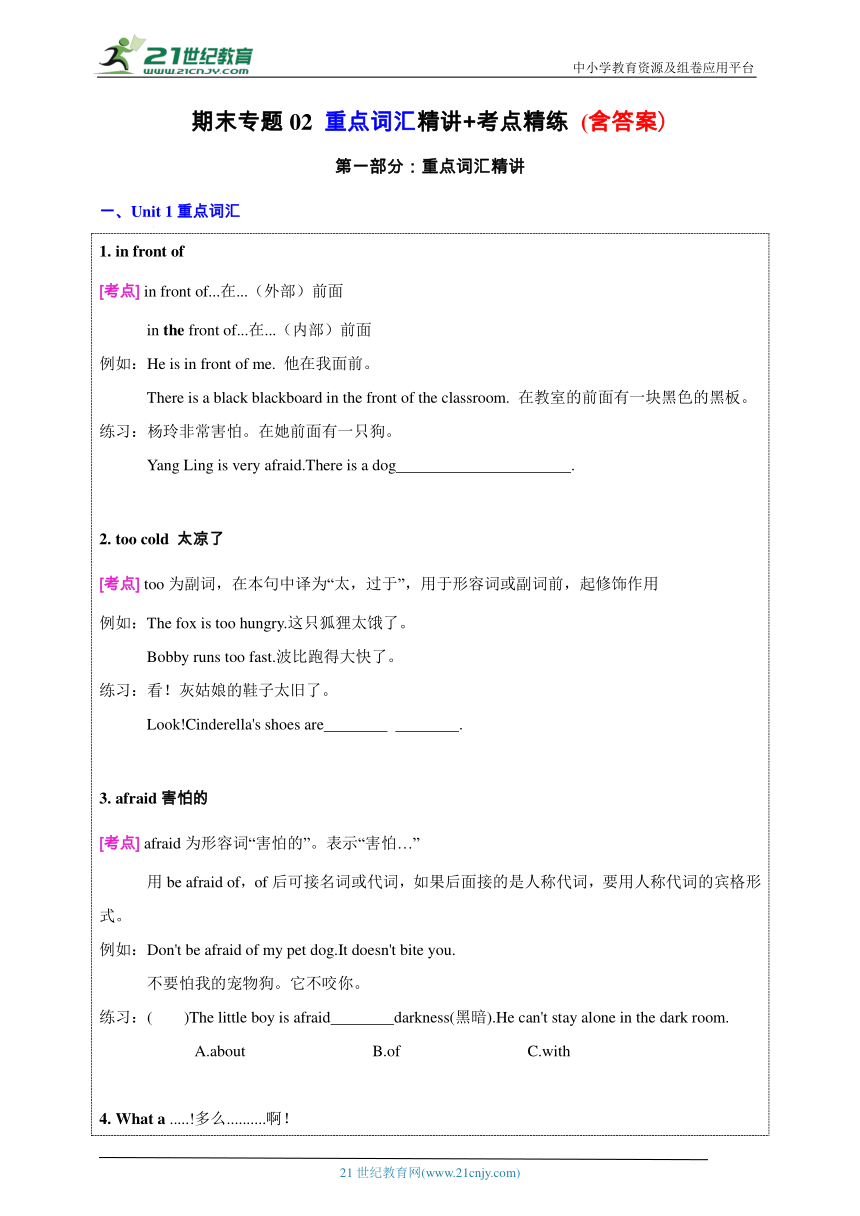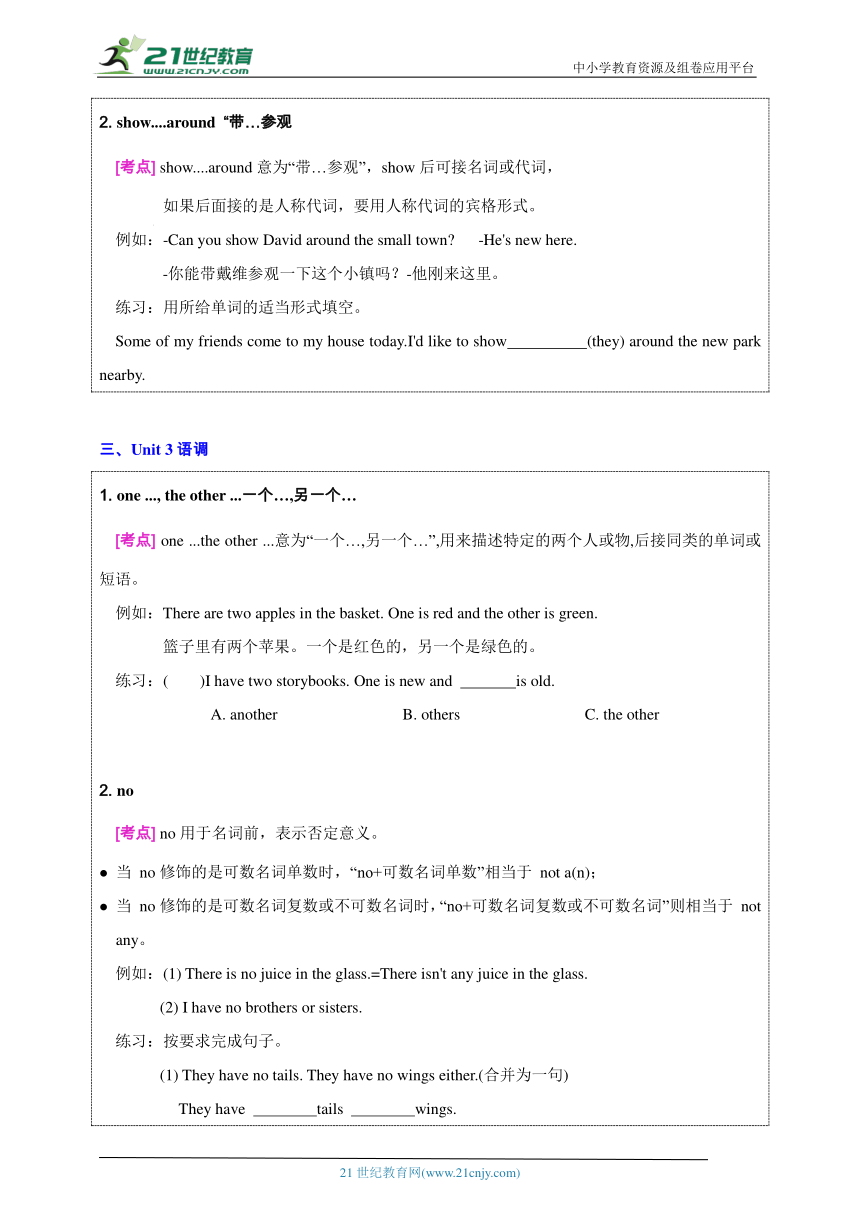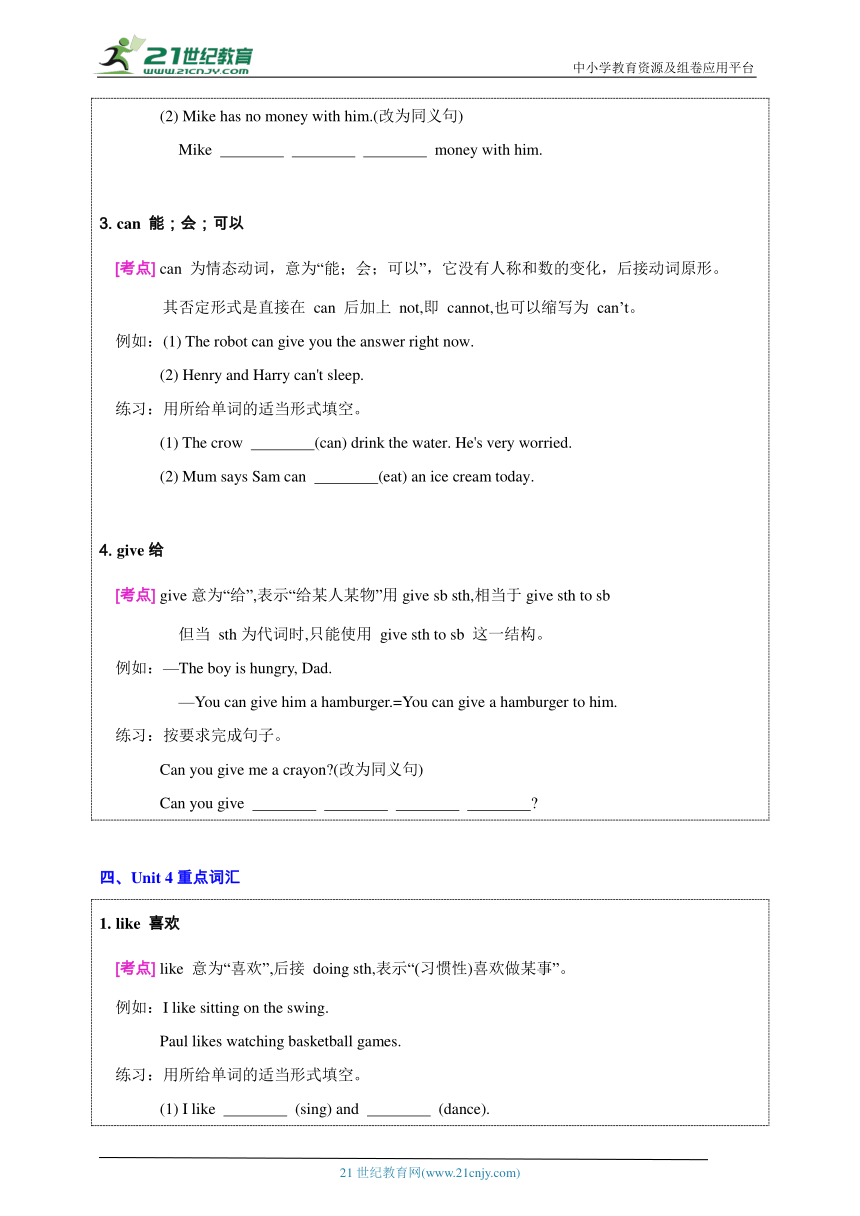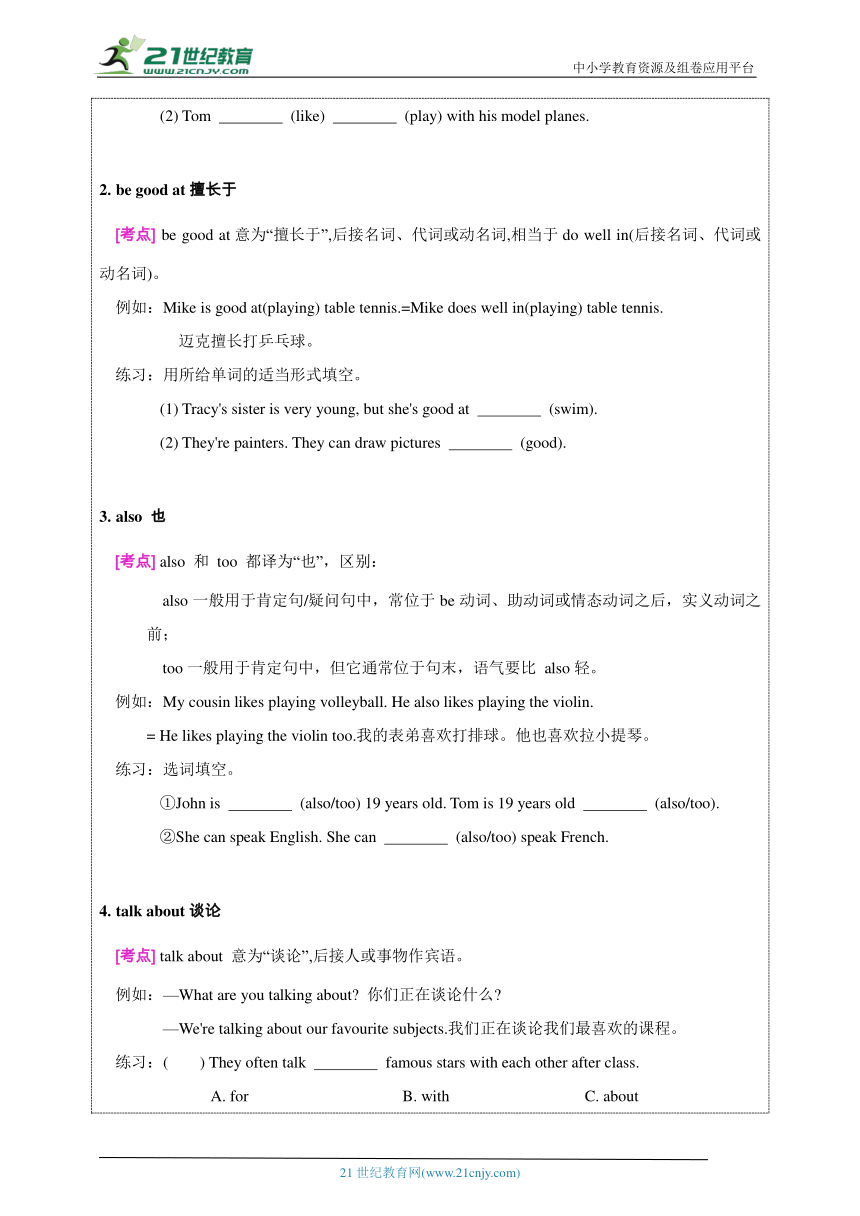专题02 词汇--2023-2024学年五年级英语上册期末专项复习(译林三起)(含答案)
文档属性
| 名称 | 专题02 词汇--2023-2024学年五年级英语上册期末专项复习(译林三起)(含答案) |  | |
| 格式 | doc | ||
| 文件大小 | 437.1KB | ||
| 资源类型 | 试卷 | ||
| 版本资源 | 牛津译林版 | ||
| 科目 | 英语 | ||
| 更新时间 | 2023-12-12 19:55:41 | ||
图片预览





文档简介
中小学教育资源及组卷应用平台
期末专题02 重点词汇精讲+考点精练 (含答案)
第一部分:重点词汇精讲
Unit 1重点词汇
in front of[考点] in front of...在...(外部)前面 in the front of...在...(内部)前面例如:He is in front of me. 他在我面前。There is a black blackboard in the front of the classroom. 在教室的前面有一块黑色的黑板。练习:杨玲非常害怕。在她前面有一只狗。Yang Ling is very afraid.There is a dog . too cold 太凉了[考点] too为副词,在本句中译为“太,过于”,用于形容词或副词前,起修饰作用例如:The fox is too hungry.这只狐狸太饿了。Bobby runs too fast.波比跑得大快了。练习:看!灰姑娘的鞋子太旧了。Look!Cinderella's shoes are .afraid害怕的[考点] afraid为形容词“害怕的”。表示“害怕…”用be afraid of,of后可接名词或代词,如果后面接的是人称代词,要用人称代词的宾格形式。例如:Don't be afraid of my pet dog.It doesn't bite you.不要怕我的宠物狗。它不咬你。练习:( )The little boy is afraid darkness(黑暗).He can't stay alone in the dark room.A.about B.of C.withWhat a .....!多么..........啊![考点] what引导的感叹句,句型结构“What(+a/an) +形容词+名词(+主语+谓语)”。拓展:how也可以引导感叹句,句型结构“How+形容词/副词(+主语+谓语)!”。例如:(1)What a clever child(he is)!(他是)多么聪明的一个孩子啊!(2)What cute cats(they are)!(它们是)多么可爱的猫啊!(3)What nice food(it is)!(它是)多么美味的食物啊!(4)How big the park is!多么大的公园啊!练习:根据中文提示,完成句子。多么胖的一只黑熊啊! black bear!just rightjust right译为“正合适,正好”。例如:This red coat is too small,but that blue one is just right.这件红色的外套太小了,但是那件蓝色的正合适。练习:( )The coffee is .You can drink it now.A.too hot B.too cold C.just right
Unit 2重点词汇
on the second floor 在二楼[考点] second为序数词,意为“第二”,其对应的基数词为two。序数词用来表示顺序,前面一般要加定冠词the,即“the十序数词”,意为“第几”。表示“在几楼”用“on the十序数词十floor”例如:(1)The second girl is my sister.第二个女孩是我的妹妹。(2)Our music room is on the third floor.我们的音乐室在三楼。练习:选出句子中错误的一项,并在横线上改正。( )Who is first to get to the classroom A B Cshow....around “带…参观[考点] show....around意为“带…参观”,show后可接名词或代词,如果后面接的是人称代词,要用人称代词的宾格形式。例如:-Can you show David around the small town -He's new here.-你能带戴维参观一下这个小镇吗?-他刚来这里。练习:用所给单词的适当形式填空。Some of my friends come to my house today.I'd like to show (they) around the new park nearby.
Unit 3语调
one ..., the other ...一个…,另一个…[考点] one ...the other ...意为“一个…,另一个…”,用来描述特定的两个人或物,后接同类的单词或短语。例如:There are two apples in the basket. One is red and the other is green.篮子里有两个苹果。一个是红色的,另一个是绿色的。练习:( )I have two storybooks. One is new and is old.A. another B. others C. the otherno[考点] no用于名词前,表示否定意义。当 no修饰的是可数名词单数时,“no+可数名词单数”相当于 not a(n);当 no修饰的是可数名词复数或不可数名词时,“no+可数名词复数或不可数名词”则相当于 not any。例如:(1) There is no juice in the glass.=There isn't any juice in the glass.(2) I have no brothers or sisters. 练习:按要求完成句子。(1) They have no tails. They have no wings either.(合并为一句)They have tails wings.(2) Mike has no money with him.(改为同义句)Mike money with him.can 能;会;可以[考点] can 为情态动词,意为“能;会;可以”,它没有人称和数的变化,后接动词原形。其否定形式是直接在 can 后加上 not,即 cannot,也可以缩写为 can’t。例如:(1) The robot can give you the answer right now.(2) Henry and Harry can't sleep. 练习:用所给单词的适当形式填空。(1) The crow (can) drink the water. He's very worried.(2) Mum says Sam can (eat) an ice cream today.give给[考点] give意为“给”,表示“给某人某物”用give sb sth,相当于give sth to sb但当 sth为代词时,只能使用 give sth to sb 这一结构。例如:—The boy is hungry, Dad.—You can give him a hamburger.=You can give a hamburger to him.练习:按要求完成句子。Can you give me a crayon (改为同义句)Can you give
Unit 4重点词汇
like 喜欢[考点] like 意为“喜欢”,后接 doing sth,表示“(习惯性)喜欢做某事”。例如:I like sitting on the swing. Paul likes watching basketball games. 练习:用所给单词的适当形式填空。(1) I like (sing) and (dance).(2) Tom (like) (play) with his model planes.be good at擅长于[考点] be good at意为“擅长于”,后接名词、代词或动名词,相当于do well in(后接名词、代词或动名词)。例如:Mike is good at(playing) table tennis.=Mike does well in(playing) table tennis.迈克擅长打乒乓球。练习:用所给单词的适当形式填空。(1) Tracy's sister is very young, but she's good at (swim).(2) They're painters. They can draw pictures (good).also 也[考点] also 和 too 都译为“也”,区别:also一般用于肯定句/疑问句中,常位于be动词、助动词或情态动词之后,实义动词之前;too一般用于肯定句中,但它通常位于句末,语气要比 also轻。例如:My cousin likes playing volleyball. He also likes playing the violin.= He likes playing the violin too.我的表弟喜欢打排球。他也喜欢拉小提琴。练习:选词填空。①John is (also/too) 19 years old. Tom is 19 years old (also/too).②She can speak English. She can (also/too) speak French.talk about谈论[考点] talk about 意为“谈论”,后接人或事物作宾语。例如:—What are you talking about 你们正在谈论什么 —We're talking about our favourite subjects.我们正在谈论我们最喜欢的课程。练习:( ) They often talk famous stars with each other after class.A. for B. with C. abouton the ice在冰上[考点] on the ice 是指在冰的表面上in the ice 是指在冰里面练习:选词填空。(1) There is a big hole (on/in) the ice.(2) The girl skates (on/in) the ice in winter.
Unit 5重点词汇
What about … ”“……怎么样 [考点] 相当于“How about… ”,后可接名词、代词或动名词【例句】(1) I'd like a cup of coffee. What about him 我想要一杯咖啡。他呢 (2) It's a nice day today. What about flying kites 今天天气不错。去放风筝怎么样 【练习】用所给单词的适当形式填空。—What about (go) climbing tomorrow, Wang Bing —Good idea. I can't wait!at home 在家[考点] at home固定短语,意为“在家”,此时 home 前不加定冠词the。类似的短语还有: at school, at sea(在海上;在海里), in class。【例句】Do you have Computer Studies at school 你在学校有电脑课吗 【练习】水手们在海上迷失了方向。The sailors are lost .help帮助[考点] help 意为“帮助”,其具体用法如下:(1)“help+名词或人称代词的宾格形式”,意为“帮助……”。(2) help sb(to) do sth意为“帮助某人做某事”。(3) help sb with sth意为“在某方面帮助某人”。【例句】(1)—Who can help him 谁能帮助他 —His friends.他的朋友们。(2) I help my mother(to) do the housework on Sundays.(3) The teacher often helps her with her lessons.【练习】( ) Can you help me my homework A. doing B. for C. withso如此,这么[考点] so为程度副词,意为“如此,这么”,用于形容词或副词之前,起修饰作用。so many意为“如此多的”,后接可数名词复数。【拓展】so much也译为“如此多的”,但它后接不可数名词。【例句】(1) There are so many trees on the hill.小山上有如此多的树。(2) You shouldn't spend so much time on it. 你不应该花如此多的时间在这件事上。【练习】选词填空。(1) There are (so many/so much) forests around the mountain.(2) The pig has (so many/so much) food at a time.
Unit 6重点词汇
Wait a minute[考点] wait a minute 意为“等一会儿”,相当于 wait a moment。【例句】—Let's go fishing, Mr Green. —Wait a minute. I'm looking for my fishing rod. 【练习】你能等一会儿吗 我有一些话要对安说。Can you I have something to say to Ann.speak讲[考点] speak Chinese 意为“说汉语”,表示说某种语言要用动词 speak。拓展:表示“和某人讲话”用 speak to sb。speak 还可以作电话用语,意为“谈话;交谈”。【例句】Su Hai can speak Japanese. May I speak to Mr White 【练习】( ) My grandfather is good at English.A. telling B. speaking C. sayinggo fishing去钓鱼[考点] go fishing 意为“去钓鱼”,go与表示活动、消遣等方面的动名词连用,表示从事某项消遣活动。【例句】What about going shopping with us this weekend Where can we go boating 【练习】用所给单词的适当形式填空。It's crazy of you to go (skate) on such thin ice.by[考点] by用作介词,意为“在……旁边”。【例句】There's an old house by the forest. 森林旁边有一栋老房子。【练习】过来坐在我旁边。咱们一起看这场比赛。Come and . Let’s watch the game together.
Unit 7重点词汇
play with 和……一起玩[考点] play with 意为“和……一起玩”,后接名词或人称代词的宾格形式。拓展:with 和 and 都有“和”的意思,但在用法上有所不同。with 为介词,后接名词或人称代词的宾格形式,且紧接其后的成分不能在句子中作主语。and 为连词,用来连接两个并列的成分。当它连接同一个句子中的两个主语时,后面的谓语动词要用复数形式。【例句】I want to play with Bobby. He goes to the park with his family. =He and his family go to the park. 【练习】( ) My father I usually watch TV at weekends, but sometimes we play_the dog.A. and; with B. with; and C. and; andusually通常[考点] usually频度副词,意为“通常”。频度副词常用于 be 动词、助动词之后,实义动词之前。常见的频度副词还有always(总是,一直), often(经常,常常),sometimes(有时), seldom(不常;很少), never(从不;绝不),它们按照频率高低排序为 always>usually>often>sometimes>seldom>never。【例句】Sometimes Yang Ling goes to the supermarket with her friends.杨玲有时和她的朋友们一起去超市。【练习】—他们总是在星期六下午做他们的家庭作业吗 —不。他们去看电影。—Do they on Saturday afternoon —No. They the .a lot[考点] a lot 是口语中常用的一个短语,其主要用法有以下两点:(1)作名词短语,意为“很多”,此时后面可接动词不定式短语作后置定语。(2)作副词短语,意为“很;非常”,用于动词、形容词等后,起修饰作用。【拓展】a lot of 也有“很多”的意思,后接可数名词复数或不可数名词。【例句】(1) Liu Tao gives her a lot to eat.刘涛给她很多吃的东西。(2) Sometimes there's very little snow here, but sometimes it snows a lot.(3) The king has a lot of money/palaces now. He's very rich.那位国王现在有很多钱/宫殿。他很富有。【练习】单项选择。( ) It usually rains here in summer.A. lots of B. a lot C. lot ofcome out出来[考点] come out意为“出来”,其同义短语为 get out。【例句】Sam, come out and have dinner with us. 山姆,出来和我们一起吃晚饭。The mouse can't get out of the bag because it eats a lot of rice.【练习】—请等一会儿。我十分钟内就出来。 —好的。—Please a . I’ll in ten minutes. —OK.
Unit 8重点词汇
at Christmas在圣诞节(期间)[考点] at Christmas意为“在圣诞节(期间)”,指的是在圣诞节前后的一段时间。【拓展】on Christmas Day也可以译为“在圣诞节”,但它指的是在圣诞节当天。【例句】I will come back at Christmas. 我将在圣诞节(期间)回来。Children always get many presents on Christmas Day.孩子们总是在圣诞节(当天)收到许多礼物。【练习】单项选择。( ) We have a great time Christmas Day.A. in B. on C. at(2)选出句子中错误的一项,并在横线上改正。( ) We often buy a Christmas tree on Christmas. A B Cfirst 首先[考点] first 为表示顺序的副词,意为“首先”。在本单元中,表示顺序的副词还有:next(接着,然后), then(然后), finally(最后)【例句】First, make two snowballs. 首先,做两个雪球。Next, put the small one on the big one. 接着,把小雪球放在大雪球上。Then, put two black balls on the face as the eyes. 然后,把两个黑色的球放在脸上作为眼睛。Finally, put a carrot on the face as the nose. 最后,把一根胡萝卜放在脸上作为鼻子。【练习】首先,我想告诉你的家人一件重要的事情。 ,I'd like to tell your an important thing.put …on …把……放在……上[考点] put …on …意为“把……放在……上”。【拓展】根据实际情况, put也可以与其他方位介词搭配使用,如in, into, behind等。【例句】Can I put the book on the desk 我能把这本书放在课桌上吗 Don't put your finger in your mouth. 不要把你的手指放在嘴里。【练习】( )Children their shoes their beds.A. puts; beside B. put; under C. put; in frontwait for等候,等待[考点] wait for 意为“等候,等待”,后接名词或人称代词的宾格形式作宾语。表示“等待某人做某事”用wait for sb to do sth。 例如:Let's wait for the guests to come. 咱们等待客人到来吧。练习:( )You can in the meeting room.A. wait me B. wait for we C. wait for mewake up 醒来;叫醒[考点] wake up 意为“醒来;叫醒”,可以单独使用,也可以后接宾语,但如果所接的宾语为人称代词的宾格形式,则要将人称代词的宾格形式放在 wake和 up中间。【例句】I wake up at seven o’clock every morning.我每天早上七点钟醒来。Wake him up, please. It's time for class. 请叫醒他。是上课的时候了。【练习】刘涛早上总是早早地醒来。Liu Tao always in the morning.
第二部分:考点精练
用所给词的适当形式填空。
(that) are cows.
Who (be) you
There (be) some water in the glass.
There are two boys in front of (she).
There aren’t (some) balls in the playground.
I can see the chair between the (desk).
Su Hai and Su Yang can’t find (they) glasses.
There (be) three beds in the room.
Jim and Su Hai (have) any umbrellas
Nancy likes (panda) best.
I have a little cat. (it) body is soft.
There (be) some (fish) in the pond.
The pig has four fat (foot).
Does your sister (have) an animal friend
My dog can’t (talk).
How many hats (do) George have
I like . I can well. I’m good at (dance).
My little sister (not like) going shopping.
My friend’s (hobby) (be) playing basketball and football.
—Can your mother (make) clothes
—No, she can’t.
Bobby (like) (have) cakes, but Sam likes (drink) juice.
They all (work) in the factory.
Why do you like (drive)
(do) your parents (read) newspapers every day
There are some (policeman) in the police office now.
My brother likes . He can (cook) nice food.
your sister a (nurse)
Helen (not do) her homework at school.
They all (work) in the factory.
Why do you like (drive)
(do) your parents (read) newspapers every day
There are some (policeman) in the police office now.
My brother likes . He can (cook) nice food.
your sister a (nurse)
Helen (not do) her homework at school.
— (do) Mr Green like (skate)
—No, he (do).
Are you good at (swim)
Yang Ling can’t (play) football well.
There (be) any books on the desk.
Mike (watch) TV every day.
How many (mango) are there on the table
Mr Zhang is a (work). He (make) cars. He (work) hard.
He has (China) lessons at school.
—How old is your brother
—He’s 11 (year) old.
What (do) your friends do after class
I’m not good at (play) football.
—Can you (speak) English, Wang Bing
—Yes, I can.
I (not have) any apples now.
Su Yang (like) English and Music.
My uncle (teach) Chinese in a middle school.
I like (sing) with my classmates.
Does Mike swim (good)
Hello, I’m from (Chinese ).
—Can your father (speak) English
—Yes, he can.
She sometimes (chat) with hi friends on the phone.
Su Yang’s parents usually (visit) her grandparents on Saturdays.
We like (play) football after school.
—What Sandy usually (do)
—She usually reads books.
Helen often (go) to the cinema.
Nancy has a (dance) lesson.
Don’t (open) this present. It’s for Jane.
Their sister (not like) (eat) pudding.
Mrs Brown usually (buy) pretty things and (put) them on the tree.
Then, Christmas Eve (come).
On New Year’s Day, (child) always give presents to each other.
(one), they buy a Christmas tree.
用方框中选给单词或短语的适当形式填空。
(A)
too hot tired in front of there be what
My mother is very now. She wants to go to bed.
The tea is .
Mike is his cousin Jack.
some tigers in the forest.
a beautiful girl!
(B)
long short big swim fly heavy give finger
A parrot has a mouth.
We have ten .
Look! The bird can very high.
The dog has a tail.
A rabbit has two ears.
Can you me some bread
This box is very . But I can push it.
My animal friend is a fish. It can .
参考答案
一、1.are 2.is 3.her 4.any 5.desks 6.their 7.are 8.are
9.Do; have 10.pandas 11.Its 12.are; fish 13.feet 14.have 15.talk
16.does 17.dancing; dance; dancing 18.doesn’t like 19.hobbies; are
20.make 21.likes having; drinking 22.work 23.driving 24.Do; read
25.policemen 26.cooking; cook 27.Is; nurse 28.doesn’t do
29.Does; skating; doesn’t 30.swimming 31.play 32.aren’t 33.watches
34.mangoes 35.worker; makes; works 36.Does; skating; doesn’t
37.swimming 38.play 39.aren’t 40.watches 41.mangoes
42.worker; makes; works 43.Chinese 44.years 45.do
46.playing 47.speak 48.don’t have 49.likes 50.teaches 51.singing
52.well 53.China 54.speak 55.chats 56.visit 57.playing 58.does; do
59.goes 60.dancing 61.open 62.doesn’t like; eating 63.buts; puts
es 65.children 66.First
二、(A)1.tired 2.too hot 3.in front of 4.There are 5.What
(B)1.big 2.fingers 3.fly 4.short 5.long 6.give 7.heavy 8.swim
HYPERLINK "http://21世纪教育网(www.21cnjy.com)
" 21世纪教育网(www.21cnjy.com)
期末专题02 重点词汇精讲+考点精练 (含答案)
第一部分:重点词汇精讲
Unit 1重点词汇
in front of[考点] in front of...在...(外部)前面 in the front of...在...(内部)前面例如:He is in front of me. 他在我面前。There is a black blackboard in the front of the classroom. 在教室的前面有一块黑色的黑板。练习:杨玲非常害怕。在她前面有一只狗。Yang Ling is very afraid.There is a dog . too cold 太凉了[考点] too为副词,在本句中译为“太,过于”,用于形容词或副词前,起修饰作用例如:The fox is too hungry.这只狐狸太饿了。Bobby runs too fast.波比跑得大快了。练习:看!灰姑娘的鞋子太旧了。Look!Cinderella's shoes are .afraid害怕的[考点] afraid为形容词“害怕的”。表示“害怕…”用be afraid of,of后可接名词或代词,如果后面接的是人称代词,要用人称代词的宾格形式。例如:Don't be afraid of my pet dog.It doesn't bite you.不要怕我的宠物狗。它不咬你。练习:( )The little boy is afraid darkness(黑暗).He can't stay alone in the dark room.A.about B.of C.withWhat a .....!多么..........啊![考点] what引导的感叹句,句型结构“What(+a/an) +形容词+名词(+主语+谓语)”。拓展:how也可以引导感叹句,句型结构“How+形容词/副词(+主语+谓语)!”。例如:(1)What a clever child(he is)!(他是)多么聪明的一个孩子啊!(2)What cute cats(they are)!(它们是)多么可爱的猫啊!(3)What nice food(it is)!(它是)多么美味的食物啊!(4)How big the park is!多么大的公园啊!练习:根据中文提示,完成句子。多么胖的一只黑熊啊! black bear!just rightjust right译为“正合适,正好”。例如:This red coat is too small,but that blue one is just right.这件红色的外套太小了,但是那件蓝色的正合适。练习:( )The coffee is .You can drink it now.A.too hot B.too cold C.just right
Unit 2重点词汇
on the second floor 在二楼[考点] second为序数词,意为“第二”,其对应的基数词为two。序数词用来表示顺序,前面一般要加定冠词the,即“the十序数词”,意为“第几”。表示“在几楼”用“on the十序数词十floor”例如:(1)The second girl is my sister.第二个女孩是我的妹妹。(2)Our music room is on the third floor.我们的音乐室在三楼。练习:选出句子中错误的一项,并在横线上改正。( )Who is first to get to the classroom A B Cshow....around “带…参观[考点] show....around意为“带…参观”,show后可接名词或代词,如果后面接的是人称代词,要用人称代词的宾格形式。例如:-Can you show David around the small town -He's new here.-你能带戴维参观一下这个小镇吗?-他刚来这里。练习:用所给单词的适当形式填空。Some of my friends come to my house today.I'd like to show (they) around the new park nearby.
Unit 3语调
one ..., the other ...一个…,另一个…[考点] one ...the other ...意为“一个…,另一个…”,用来描述特定的两个人或物,后接同类的单词或短语。例如:There are two apples in the basket. One is red and the other is green.篮子里有两个苹果。一个是红色的,另一个是绿色的。练习:( )I have two storybooks. One is new and is old.A. another B. others C. the otherno[考点] no用于名词前,表示否定意义。当 no修饰的是可数名词单数时,“no+可数名词单数”相当于 not a(n);当 no修饰的是可数名词复数或不可数名词时,“no+可数名词复数或不可数名词”则相当于 not any。例如:(1) There is no juice in the glass.=There isn't any juice in the glass.(2) I have no brothers or sisters. 练习:按要求完成句子。(1) They have no tails. They have no wings either.(合并为一句)They have tails wings.(2) Mike has no money with him.(改为同义句)Mike money with him.can 能;会;可以[考点] can 为情态动词,意为“能;会;可以”,它没有人称和数的变化,后接动词原形。其否定形式是直接在 can 后加上 not,即 cannot,也可以缩写为 can’t。例如:(1) The robot can give you the answer right now.(2) Henry and Harry can't sleep. 练习:用所给单词的适当形式填空。(1) The crow (can) drink the water. He's very worried.(2) Mum says Sam can (eat) an ice cream today.give给[考点] give意为“给”,表示“给某人某物”用give sb sth,相当于give sth to sb但当 sth为代词时,只能使用 give sth to sb 这一结构。例如:—The boy is hungry, Dad.—You can give him a hamburger.=You can give a hamburger to him.练习:按要求完成句子。Can you give me a crayon (改为同义句)Can you give
Unit 4重点词汇
like 喜欢[考点] like 意为“喜欢”,后接 doing sth,表示“(习惯性)喜欢做某事”。例如:I like sitting on the swing. Paul likes watching basketball games. 练习:用所给单词的适当形式填空。(1) I like (sing) and (dance).(2) Tom (like) (play) with his model planes.be good at擅长于[考点] be good at意为“擅长于”,后接名词、代词或动名词,相当于do well in(后接名词、代词或动名词)。例如:Mike is good at(playing) table tennis.=Mike does well in(playing) table tennis.迈克擅长打乒乓球。练习:用所给单词的适当形式填空。(1) Tracy's sister is very young, but she's good at (swim).(2) They're painters. They can draw pictures (good).also 也[考点] also 和 too 都译为“也”,区别:also一般用于肯定句/疑问句中,常位于be动词、助动词或情态动词之后,实义动词之前;too一般用于肯定句中,但它通常位于句末,语气要比 also轻。例如:My cousin likes playing volleyball. He also likes playing the violin.= He likes playing the violin too.我的表弟喜欢打排球。他也喜欢拉小提琴。练习:选词填空。①John is (also/too) 19 years old. Tom is 19 years old (also/too).②She can speak English. She can (also/too) speak French.talk about谈论[考点] talk about 意为“谈论”,后接人或事物作宾语。例如:—What are you talking about 你们正在谈论什么 —We're talking about our favourite subjects.我们正在谈论我们最喜欢的课程。练习:( ) They often talk famous stars with each other after class.A. for B. with C. abouton the ice在冰上[考点] on the ice 是指在冰的表面上in the ice 是指在冰里面练习:选词填空。(1) There is a big hole (on/in) the ice.(2) The girl skates (on/in) the ice in winter.
Unit 5重点词汇
What about … ”“……怎么样 [考点] 相当于“How about… ”,后可接名词、代词或动名词【例句】(1) I'd like a cup of coffee. What about him 我想要一杯咖啡。他呢 (2) It's a nice day today. What about flying kites 今天天气不错。去放风筝怎么样 【练习】用所给单词的适当形式填空。—What about (go) climbing tomorrow, Wang Bing —Good idea. I can't wait!at home 在家[考点] at home固定短语,意为“在家”,此时 home 前不加定冠词the。类似的短语还有: at school, at sea(在海上;在海里), in class。【例句】Do you have Computer Studies at school 你在学校有电脑课吗 【练习】水手们在海上迷失了方向。The sailors are lost .help帮助[考点] help 意为“帮助”,其具体用法如下:(1)“help+名词或人称代词的宾格形式”,意为“帮助……”。(2) help sb(to) do sth意为“帮助某人做某事”。(3) help sb with sth意为“在某方面帮助某人”。【例句】(1)—Who can help him 谁能帮助他 —His friends.他的朋友们。(2) I help my mother(to) do the housework on Sundays.(3) The teacher often helps her with her lessons.【练习】( ) Can you help me my homework A. doing B. for C. withso如此,这么[考点] so为程度副词,意为“如此,这么”,用于形容词或副词之前,起修饰作用。so many意为“如此多的”,后接可数名词复数。【拓展】so much也译为“如此多的”,但它后接不可数名词。【例句】(1) There are so many trees on the hill.小山上有如此多的树。(2) You shouldn't spend so much time on it. 你不应该花如此多的时间在这件事上。【练习】选词填空。(1) There are (so many/so much) forests around the mountain.(2) The pig has (so many/so much) food at a time.
Unit 6重点词汇
Wait a minute[考点] wait a minute 意为“等一会儿”,相当于 wait a moment。【例句】—Let's go fishing, Mr Green. —Wait a minute. I'm looking for my fishing rod. 【练习】你能等一会儿吗 我有一些话要对安说。Can you I have something to say to Ann.speak讲[考点] speak Chinese 意为“说汉语”,表示说某种语言要用动词 speak。拓展:表示“和某人讲话”用 speak to sb。speak 还可以作电话用语,意为“谈话;交谈”。【例句】Su Hai can speak Japanese. May I speak to Mr White 【练习】( ) My grandfather is good at English.A. telling B. speaking C. sayinggo fishing去钓鱼[考点] go fishing 意为“去钓鱼”,go与表示活动、消遣等方面的动名词连用,表示从事某项消遣活动。【例句】What about going shopping with us this weekend Where can we go boating 【练习】用所给单词的适当形式填空。It's crazy of you to go (skate) on such thin ice.by[考点] by用作介词,意为“在……旁边”。【例句】There's an old house by the forest. 森林旁边有一栋老房子。【练习】过来坐在我旁边。咱们一起看这场比赛。Come and . Let’s watch the game together.
Unit 7重点词汇
play with 和……一起玩[考点] play with 意为“和……一起玩”,后接名词或人称代词的宾格形式。拓展:with 和 and 都有“和”的意思,但在用法上有所不同。with 为介词,后接名词或人称代词的宾格形式,且紧接其后的成分不能在句子中作主语。and 为连词,用来连接两个并列的成分。当它连接同一个句子中的两个主语时,后面的谓语动词要用复数形式。【例句】I want to play with Bobby. He goes to the park with his family. =He and his family go to the park. 【练习】( ) My father I usually watch TV at weekends, but sometimes we play_the dog.A. and; with B. with; and C. and; andusually通常[考点] usually频度副词,意为“通常”。频度副词常用于 be 动词、助动词之后,实义动词之前。常见的频度副词还有always(总是,一直), often(经常,常常),sometimes(有时), seldom(不常;很少), never(从不;绝不),它们按照频率高低排序为 always>usually>often>sometimes>seldom>never。【例句】Sometimes Yang Ling goes to the supermarket with her friends.杨玲有时和她的朋友们一起去超市。【练习】—他们总是在星期六下午做他们的家庭作业吗 —不。他们去看电影。—Do they on Saturday afternoon —No. They the .a lot[考点] a lot 是口语中常用的一个短语,其主要用法有以下两点:(1)作名词短语,意为“很多”,此时后面可接动词不定式短语作后置定语。(2)作副词短语,意为“很;非常”,用于动词、形容词等后,起修饰作用。【拓展】a lot of 也有“很多”的意思,后接可数名词复数或不可数名词。【例句】(1) Liu Tao gives her a lot to eat.刘涛给她很多吃的东西。(2) Sometimes there's very little snow here, but sometimes it snows a lot.(3) The king has a lot of money/palaces now. He's very rich.那位国王现在有很多钱/宫殿。他很富有。【练习】单项选择。( ) It usually rains here in summer.A. lots of B. a lot C. lot ofcome out出来[考点] come out意为“出来”,其同义短语为 get out。【例句】Sam, come out and have dinner with us. 山姆,出来和我们一起吃晚饭。The mouse can't get out of the bag because it eats a lot of rice.【练习】—请等一会儿。我十分钟内就出来。 —好的。—Please a . I’ll in ten minutes. —OK.
Unit 8重点词汇
at Christmas在圣诞节(期间)[考点] at Christmas意为“在圣诞节(期间)”,指的是在圣诞节前后的一段时间。【拓展】on Christmas Day也可以译为“在圣诞节”,但它指的是在圣诞节当天。【例句】I will come back at Christmas. 我将在圣诞节(期间)回来。Children always get many presents on Christmas Day.孩子们总是在圣诞节(当天)收到许多礼物。【练习】单项选择。( ) We have a great time Christmas Day.A. in B. on C. at(2)选出句子中错误的一项,并在横线上改正。( ) We often buy a Christmas tree on Christmas. A B Cfirst 首先[考点] first 为表示顺序的副词,意为“首先”。在本单元中,表示顺序的副词还有:next(接着,然后), then(然后), finally(最后)【例句】First, make two snowballs. 首先,做两个雪球。Next, put the small one on the big one. 接着,把小雪球放在大雪球上。Then, put two black balls on the face as the eyes. 然后,把两个黑色的球放在脸上作为眼睛。Finally, put a carrot on the face as the nose. 最后,把一根胡萝卜放在脸上作为鼻子。【练习】首先,我想告诉你的家人一件重要的事情。 ,I'd like to tell your an important thing.put …on …把……放在……上[考点] put …on …意为“把……放在……上”。【拓展】根据实际情况, put也可以与其他方位介词搭配使用,如in, into, behind等。【例句】Can I put the book on the desk 我能把这本书放在课桌上吗 Don't put your finger in your mouth. 不要把你的手指放在嘴里。【练习】( )Children their shoes their beds.A. puts; beside B. put; under C. put; in frontwait for等候,等待[考点] wait for 意为“等候,等待”,后接名词或人称代词的宾格形式作宾语。表示“等待某人做某事”用wait for sb to do sth。 例如:Let's wait for the guests to come. 咱们等待客人到来吧。练习:( )You can in the meeting room.A. wait me B. wait for we C. wait for mewake up 醒来;叫醒[考点] wake up 意为“醒来;叫醒”,可以单独使用,也可以后接宾语,但如果所接的宾语为人称代词的宾格形式,则要将人称代词的宾格形式放在 wake和 up中间。【例句】I wake up at seven o’clock every morning.我每天早上七点钟醒来。Wake him up, please. It's time for class. 请叫醒他。是上课的时候了。【练习】刘涛早上总是早早地醒来。Liu Tao always in the morning.
第二部分:考点精练
用所给词的适当形式填空。
(that) are cows.
Who (be) you
There (be) some water in the glass.
There are two boys in front of (she).
There aren’t (some) balls in the playground.
I can see the chair between the (desk).
Su Hai and Su Yang can’t find (they) glasses.
There (be) three beds in the room.
Jim and Su Hai (have) any umbrellas
Nancy likes (panda) best.
I have a little cat. (it) body is soft.
There (be) some (fish) in the pond.
The pig has four fat (foot).
Does your sister (have) an animal friend
My dog can’t (talk).
How many hats (do) George have
I like . I can well. I’m good at (dance).
My little sister (not like) going shopping.
My friend’s (hobby) (be) playing basketball and football.
—Can your mother (make) clothes
—No, she can’t.
Bobby (like) (have) cakes, but Sam likes (drink) juice.
They all (work) in the factory.
Why do you like (drive)
(do) your parents (read) newspapers every day
There are some (policeman) in the police office now.
My brother likes . He can (cook) nice food.
your sister a (nurse)
Helen (not do) her homework at school.
They all (work) in the factory.
Why do you like (drive)
(do) your parents (read) newspapers every day
There are some (policeman) in the police office now.
My brother likes . He can (cook) nice food.
your sister a (nurse)
Helen (not do) her homework at school.
— (do) Mr Green like (skate)
—No, he (do).
Are you good at (swim)
Yang Ling can’t (play) football well.
There (be) any books on the desk.
Mike (watch) TV every day.
How many (mango) are there on the table
Mr Zhang is a (work). He (make) cars. He (work) hard.
He has (China) lessons at school.
—How old is your brother
—He’s 11 (year) old.
What (do) your friends do after class
I’m not good at (play) football.
—Can you (speak) English, Wang Bing
—Yes, I can.
I (not have) any apples now.
Su Yang (like) English and Music.
My uncle (teach) Chinese in a middle school.
I like (sing) with my classmates.
Does Mike swim (good)
Hello, I’m from (Chinese ).
—Can your father (speak) English
—Yes, he can.
She sometimes (chat) with hi friends on the phone.
Su Yang’s parents usually (visit) her grandparents on Saturdays.
We like (play) football after school.
—What Sandy usually (do)
—She usually reads books.
Helen often (go) to the cinema.
Nancy has a (dance) lesson.
Don’t (open) this present. It’s for Jane.
Their sister (not like) (eat) pudding.
Mrs Brown usually (buy) pretty things and (put) them on the tree.
Then, Christmas Eve (come).
On New Year’s Day, (child) always give presents to each other.
(one), they buy a Christmas tree.
用方框中选给单词或短语的适当形式填空。
(A)
too hot tired in front of there be what
My mother is very now. She wants to go to bed.
The tea is .
Mike is his cousin Jack.
some tigers in the forest.
a beautiful girl!
(B)
long short big swim fly heavy give finger
A parrot has a mouth.
We have ten .
Look! The bird can very high.
The dog has a tail.
A rabbit has two ears.
Can you me some bread
This box is very . But I can push it.
My animal friend is a fish. It can .
参考答案
一、1.are 2.is 3.her 4.any 5.desks 6.their 7.are 8.are
9.Do; have 10.pandas 11.Its 12.are; fish 13.feet 14.have 15.talk
16.does 17.dancing; dance; dancing 18.doesn’t like 19.hobbies; are
20.make 21.likes having; drinking 22.work 23.driving 24.Do; read
25.policemen 26.cooking; cook 27.Is; nurse 28.doesn’t do
29.Does; skating; doesn’t 30.swimming 31.play 32.aren’t 33.watches
34.mangoes 35.worker; makes; works 36.Does; skating; doesn’t
37.swimming 38.play 39.aren’t 40.watches 41.mangoes
42.worker; makes; works 43.Chinese 44.years 45.do
46.playing 47.speak 48.don’t have 49.likes 50.teaches 51.singing
52.well 53.China 54.speak 55.chats 56.visit 57.playing 58.does; do
59.goes 60.dancing 61.open 62.doesn’t like; eating 63.buts; puts
es 65.children 66.First
二、(A)1.tired 2.too hot 3.in front of 4.There are 5.What
(B)1.big 2.fingers 3.fly 4.short 5.long 6.give 7.heavy 8.swim
HYPERLINK "http://21世纪教育网(www.21cnjy.com)
" 21世纪教育网(www.21cnjy.com)
同课章节目录
